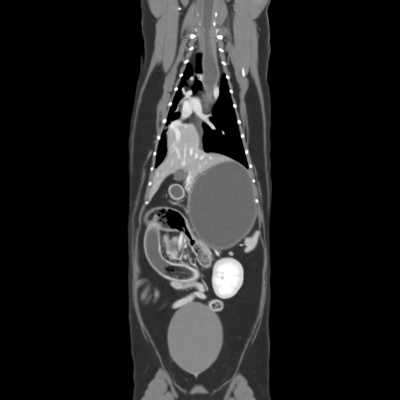 What is a CT scan?
What is a CT scan?
CT (Computed Tomography) utilizes the same technology as X-rays to form images. The main advantage of CT over X-rays is that it allows us to look at the body in cross-section with higher detail. CT images can also be reformatted to make three-dimensional reconstructions. CT examinations are most valuable when looking at bony structures or the lungs. It can also be used to look at soft tissues such as the abdominal organs. CT images are sometimes enhanced with the use of intravenous contrast agents.
How long does a CT scan take?
A CT scan usually takes 10-15 minutes. While it is painless, light anesthesia is required to keep your pet completely still during the procedure. Each CT is tailored to obtain the highest quality images with the least amount of time under anesthesia necessary.
What is contrast used for and is it safe?
Contrast is given intravenously during the exam at the discretion of the prescribing clinician. It is given to patients during the CT to help determine the underlying cause for the patient’s illness. Contrast is also beneficial in helping to distinguish normal from abnormal structures in parts of the body such as the lungs, liver, spleen, and bones.
Contrast in veterinary patients is very safe, and reactions to contrast agents used in CT are rare in veterinary medicine. Despite this fact, each patient is closely monitored for any potential reactions to the injection. Veterinary patients undergoing CT receive contrast during the procedure under the guidance of trained nurses and doctors.
Who monitors my pet under anesthesia?
Your pet is a member of the family, and our goal is to provide as safe an environment as possible during your pet’s CT scan. Before, during, and after the CT our patients are monitored by certified anesthesia nurses who are specially trained to deal with patients undergoing CT, and monitor your pet's breathing, heart rate, pulse oxygenation, and blood pressure. Routine blood work and chest X-rays are performed prior to the CT to minimize the risks associated with anesthesia.
The CT studies are performed by an experienced radiology technician under the guidance of a radiologist. This allows us to acquire high-quality diagnostic images in as short a time as possible, further minimizing any anesthetic risk. The specialist is also involved in every step of the CT scan including patient positioning, monitoring, study design, and interpretation. We work as a team to provide the highest level of care possible for your pet.
When are CT scans available and how soon can I schedule one?
CT scans can be regularly scheduled Monday through Friday. We are also available on emergency basis on weekends, evenings, and holidays. If your pet is having an emergency, contact your primary veterinarian or the Emergency Service at Pieper Veterinary at (860) 347-8387.
If the doctor feels that a CT scan is necessary for your pet, the study can be performed as quickly as the same day of your appointment. Ultimately, scheduling is based on the urgency of the test and your pet’s general health. It is our top priority to have your pet as strong as possible to make them good anesthetic candidates, and routine bloodwork and chest X-rays are performed prior to anesthesia.
Please remember that pets must be fasted for anesthesia. If the CT scan is to be performed the same day as your appointment, your pet should not receive any food or water from 10 pm the night prior to your appointment. This is crucial to limit complications such as aspiration pneumonia during anesthesia. If your pet has special needs (e.g., diabetes or renal disease), consult with your primary veterinarian prior to their appointment.
Where are the CTs performed?
All imaging (including MRI, CT, ultrasound, and digital radiography) is performed on-site in Middletown under the care and guidance of our trained doctors and nursing staff.
When will I have the results of my CT?
The specialist involved in your pet’s care will discuss the initial results of the CT scan shortly after completion, and further diagnostic or treatment options can be reviewed depending on the findings of the scan. CTs are reviewed the same day by a board-certified radiologist and results are typically available the same day.
How will my veterinarian know what is happening with my pet?
While pets are referred to Pieper due to the advanced diagnostic and treatment options we can offer, your veterinarian is the primary caregiver for your pet - it is crucial that they are involved and informed during the entire process. Your veterinarian will have the ability to view the CT images online, and you will receive a copy of the scan results to give to your veterinarian for your pet’s permanent records.
